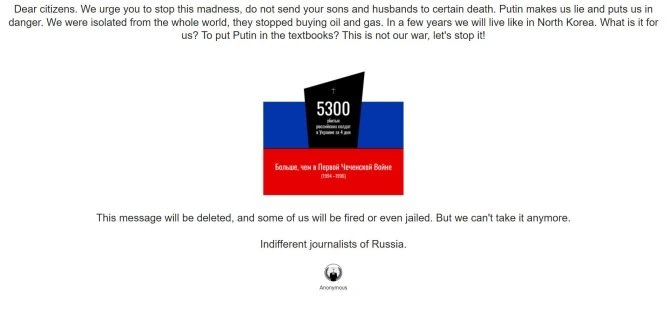Having successfully compromised more than 300 Russian websites, Anonymous hackers are offering the Kremlin-sent military 5 million rubles (about $45,000 USD) for each tank withdrawn from combat in a bid to deplete Vladimir Putin forces. The hacktivists claim to have more than a billion rubles to carry out their plan, so they advise Russian troops to hand over their tanks and simply enjoy life with that money.
This announcement comes shortly after Anonymous hackers managed to take down multiple Russian government websites, declaring a cyberwarfare against Putin’s administration and its decision to invade Ukraine. Hackers say Ukraine’s government will provide amnesty to soldiers who decide to put down their arms.
All the Russian government platforms compromised by Anonymous display the same message: “Dear citizens, we urge you to stop this madness, do not send your children and husbands to certain death. Putin is forcing us to lie and putting us in danger.”

Cyberwarfare tactics have also been deployed by the Russian military, so Ukraine has also had to prepare the defense of its computer infrastructure. Ukraine’s Minister of Digital Transformation, Mykhailo Fedorov, announced on Saturday the creation of a Telegram channel for his computer army: “We need digital talents; all operational tasks will need to be covered to fight on the cyber front.”
As some may recall, Anonymous burst onto the international scene more than 10 years ago in the context of the Occupy Wall Street movement, and since then they claim to have grown steadily. Hackers report deploying hundreds of cyberattacks against Russian organizations over the past week in retaliation for the invasion of Ukraine.
Just a few hours ago, Anonymous claimed to have compromised the computer infrastructure of Russia Today (RT), an information channel sponsored by the Russian government that is about to be banned in the European Union, along with other communication channels linked to the Kremlin.
To learn more about information security risks, malware variants, vulnerabilities and information technologies, feel free to access the International Institute of Cyber Security (IICS) websites.

He is a well-known expert in mobile security and malware analysis. He studied Computer Science at NYU and started working as a cyber security analyst in 2003. He is actively working as an anti-malware expert. He also worked for security companies like Kaspersky Lab. His everyday job includes researching about new malware and cyber security incidents. Also he has deep level of knowledge in mobile security and mobile vulnerabilities.











